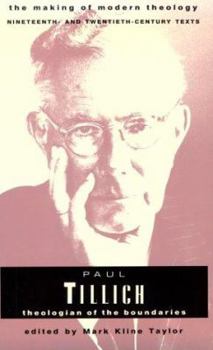Paul Tillich
Select Format
Select Condition 
Book Overview
Paul Tillich, forced into exile by the Nazis in 1933, settled in the United States. His many theological works and especially his three volume Systematic Theology have had a profound influence upon contemporary religious thought. This volume concentrates on the key texts and ideas in Tillich's thought. It presents the essential Paul Tillich for students and the general reader. Taylor's introductory essay and notes on the selected texts set...
Format:Paperback
Language:English
ISBN:0800634039
ISBN13:9780800634032
Release Date:September 1991
Publisher:Fortress Press
Length:352 Pages
Weight:1.12 lbs.
Dimensions:0.8" x 5.5" x 8.5"
Customer Reviews
2 ratings
The ground of being Tillich...
Published by Thriftbooks.com User , 20 years ago
This volume on the works of Paul Tillich is part of a series by Fortress Press entitled 'the Making of Modern Theology: Nineteenth and Twentieth Century Texts'. Each of the volumes in the series focuses upon one particular theologian of note. These volumes are of use to students, seminarians, ministers and other readers interested in the development of theological ideas in the modern and postmodern world. Each volume is a reader of key texts from the theologian highlighted - the text entries are annotated a bit by the editors, and the editor of each volume provides an introduction setting the general stage for context and understanding.Editor Mark Kline Taylor describes Tillich as being a theologian of the boundaries -- particularly the boundaries of modernity, and the boundaries of philosophy and modern intellectual development. Tillich is sometimes mistaken for being an atheist, since he makes the radical claim that God does not exist -- however, this shows the redefinitions and subtle aspects at work in Tillich's writing. Only finite things can be spoken of as 'existing'; God, not being finite, does not 'exist' in the way that any created thing exists. God becomes for Tillich the Ground of Being, that from which all existing things come and in which all in existence have their being.Tillich is not an easy read. Educated in German schools deeply influenced by liberal theology of the nineteenth century and philosophical schools reacting to the breakdown of Enlightenment thinking, Tillich sought to make theology a relevant subject in the academy. Much of his writing is primarily geared toward other academics, philosophers in particular. As Taylor remarks in his introduction, many seminarians have difficulty with Tillich, both in making real-world connections as well as traversing the language -- Tillich invents his own terminology and develops his own linguistic methods of discussing theological issues. Tillich was profoundly influenced by his experiences in the first world war, where he served as a chaplain in the trench warfare. Unlike theologians such as Barth, he initially had a young man's bravado and support for the war, until the grim realities set in. This experience would never leave Tillich, and he continued to strive all his life to craft a systematic theology that would on the one hand address the concerns of culture but at the same time resist traditional pitfalls of theology-of-culture that make it less universal, and too much a human construct. Tillich's development of Christology, with Christ as the New Being, is very significant, the way for Tillich's more general philosophical theology to find a grounding in Christianity. Tillich had a long fascination with other religions, Buddhism in particular, and was charged by some critics of relegating Christianity to a secondary status. Like many of Tillich's theological ideas, there is a tension apparent in his Christological development that exists between different tra
Paul Tillich was the last great 20th-century theologian.
Published by Thriftbooks.com User , 25 years ago
Like Karl Barth, Tillich can be hard to read for those unaccustomed to reading scholarly theological texts, but once you get past the dense language you'll find yourself probing the deepest mysteries of Christian thinking and asking questions you've never before considered.You may not agree with all of Tillich's ideas, but you simply can't ignore him when considering the deeper issues of modern theology. I highly recommend this book for anyone who wishes to deepen their faith by considering issues not considered in the day-to-day Christian world.






